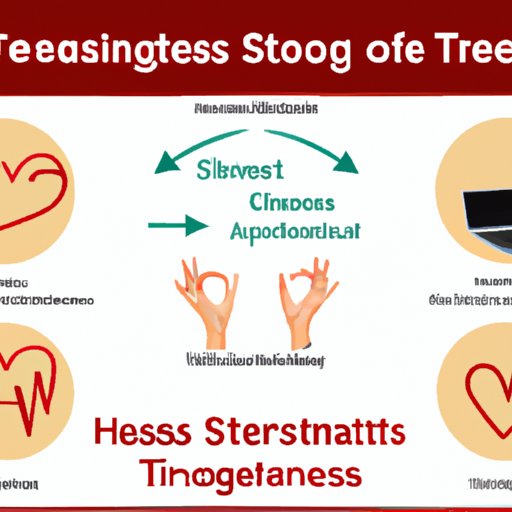
I. Introduction
Stress is a common condition that affects people at different times in their lives. It can stem from work, relationships, or life events, among other things. Heart palpitations, on the other hand, refer to the awareness of your own heartbeat -most people are not conscious of their heart beating- and can be a cause of concern for individuals.
The relationship between stress and heart palpitations is one that many people believe to exist, and the purpose of this article is to explore what science has to say on this matter.
II. Understanding the Link Between Stress and Heart Palpitations: Bridging Science and Symptoms
Studies suggest that stress and heart palpitations are related, and that there are physiological reasons behind this. The autonomic nervous system connects the heart to the brain and plays a vital role in regulating heartbeats, especially during times of stress.
When stress occurs, the body releases hormones such as adrenaline and cortisol, which prepare the body to either fight or flee the stressor. These hormones can cause an increase in heart rate and blood pressure, leading to palpitations.
Additionally, the release of stress hormones and the activation of the sympathetic nervous system can cause changes in the heart’s electrical signaling activity. These changes can manifest as abnormal heart rhythms that send signals to the brain, which individuals may experience as palpitations.
III. The Correlation between Stress and Heart Palpitations: What You Need to Know
Research findings indicate a positive correlation between stress and heart palpitations. Stress is a known risk factor for cardiovascular diseases, and chronic stress can lead to inflammation, which can damage blood vessels and increase the risk of heart diseases.
Individuals who experience stress are also more likely to experience heart palpitations. Studies have shown that people with higher levels of anxiety, depression, or stress are more likely to report frequent palpitations, suggesting that stress plays a meaningful role in the onset of palpitations.
IV. Are Heart Palpitations a Sign of Stress? A Comprehensive Guide
While palpitations can occur due to various physiological causes, they can also be a sign of stress. Understanding the signs and symptoms of heart palpitations can help individuals identify their cause more accurately.
Palpitations can manifest as a sensation of fluttering, hammering, or pounding in the chest, or a feeling of the heart pausing before racing. In cases where palpitations are caused by stress, symptoms tend to occur alongside stressful events or occur more frequently when people are feeling anxious.
There are different types of palpitations, including skipped beats, premature ventricular contractions, or atrial fibrillation. It is essential to distinguish the specific type to determine if it’s caused by stress or a medical condition.
If you experience palpitations due to stress, it may be advisable to try the following: deep breathing exercises, avoiding caffeinated drinks, and utilizing relaxation techniques such as meditation and yoga.
V. The Role of Mindfulness and Meditation in Managing Heart Palpitations Caused by Stress
Mindfulness and meditation involve focusing on internal and external experiences happening in the present moment. Mindfulness practices help people reduce their self-criticism and negative beliefs by acknowledging and accepting sensations and emotions without judgment.
Studies have shown that mindfulness practices can help reduce stress levels and, consequently, the frequency and intensity of heart palpitations. Meditation can also help improve concentration and cognitive skills, which can improve mood and overall well-being.
Some benefits of practicing mindfulness and meditation include reduced stress, improved sleep quality, eased anxiety, and increased emotional stability.
To incorporate mindfulness and meditation into your life, start by finding an available support group or use apps that offer guided meditation exercises.
VI. Coping with Stress-Induced Heart Palpitations: Lifestyle Changes and Relaxation Techniques
Making lifestyle changes can help minimize the frequency of heart palpitations caused by stress. Firstly, quitting smoking and minimizing caffeine intake can help reduce their occurrence. Secondly, staying hydrated and maintaining a healthy diet can help manage inflammation and foster cardiovascular health.
Relaxation techniques such as deep breathing, visualization, and progressive muscle relaxation can provide quick relief for palpitations. These techniques help people relax and reduce stress levels. Exercising, in particular, aerobics, can help manage psychological stress and reduce the likelihood of heart palpitations.
VII. When Stress Wreaks Havoc on Your Heart: Identifying, Treating, and Preventing Palpitations
Identifying triggers that cause palpitations can help minimize their occurrence. Stress management techniques such as cognitive-behavioral therapy or talk therapy can help promote resilience and reduce the likelihood of palpitations.
In situations where stress-induced palpitations cause concern, antianxiety medications and beta-blockers can be prescribed. These medications help regulate heart palpitations by regulating hormones such as adrenaline and cortisol levels.
It is essential to maintain a healthy lifestyle and engage in stress management techniques to reduce the risk of developing palpitations.
VIII. Stress, Anxiety, and Heart Palpitations: Breaking the Cycle for a Healthier Heart and Mind
Recognizing symptoms of anxiety such as excessive worry, fatigue, irritability, and sleep problems can help minimize stress levels that can lead to palpitations. Treatment options for anxiety include medication, talk therapy, relaxation techniques, and utilizing stress management techniques.
Practicing self-care habits such as getting adequate sleep, physical activity, and engaging in relaxing activities can also help reduce the likelihood of heart palpitations.
IX. Conclusion
The link between stress and heart palpitations has been established through numerous studies. By incorporating stress management techniques into your daily routine, you can significantly reduce the chances of experiencing palpitations and reduce cardiovascular disease risk factors from stress-induced inflammation. Understanding how to mitigate stress through lifestyle changes, relaxation techniques, and treatment options can help you lead a healthier life.
Additional resources for support and information on heart palpitations, stress management, and cardiovascular health can be found through health providers, community resources, and reputable websites.





